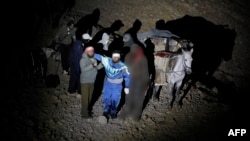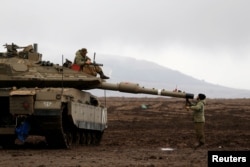Syrian rebels pinned down in a strategic area where the Israeli and Lebanese borders meet with Syria were handed an ultimatum by the Syrian army and its militia allies to either surrender or face certain military defeat, rebels said Tuesday.
The Syrian army, local militias financed and equipped by Iran, and Druze fighters from the area have been escalating a fierce assault against Sunni rebels in an enclave in the foothills of Mount Hermon.
"They were given 72 hours to surrender with fighters to go to Idlib, or those who want to stay have to reach a settlement," said Ibrahim al-Jebawi, a Free Syrian Army (FSA) official familiar with the situation on the ground.
Another rebel official who asked not to be named said they were told either to surrender or accept a "military solution."
After more than two months of near daily shelling and aerial strikes, the rebels have been left encircled in Beit Jin, their main stronghold, after losing strategic hills and farms around it this week.
The media unit of Hezbollah, the Iran-backed Lebanese militant group, said that insurgents had agreed to negotiate surrender terms and that negotiations had already begun over their evacuation in the next few days to rebel-held Idlib.
The Syrian army has used similar tactics of pushing opponents to rebel areas further from the Syrian capital after a twin tactic of siege and months of strikes on residential areas.
There were also more than 8,000 civilians who have been trapped in the remaining enclaves, with their plight worsening, according to rebel spokesman Sohaib Alraheel.
Israel alarmed
Israel is alarmed at the growing Iranian military influence in the Golan Heights and has stepped up its strikes against pro-Iranian targets inside Syria.
Israel has been lobbying major powers to deny Iran, Hezbollah and other Shiite militias any permanent bases in Syria, and to keep them away from the Golan, as they gain ground while helping Damascus beat back Sunni-led rebels.
Early this month, there was an Israeli strike on a base near Kiswah, south of Damascus, that was widely believed to be an Iranian military compound, a Western intelligence source said.
Hezbollah's bastion in southern Lebanon is only a few kilometers from the rebel enclave, and securing a supply line from its stronghold into Syria's Quneitra province was a major strategic gain, rebels and defense analysts say.
"Now Hezbollah will have a bigger foothold on the Syrian side of the Golan and it is desperate to link this area with southern Lebanon," al-Jebawi added.
Israel had warned Hezbollah against trying to open a front in the Golan Heights and was believed to be behind the killing of a prominent commander in an airstrike in 2015 whom the group later admitted had overseen a local Hezbollah presence in the area.
"This is an effort by Iran and its proxy Hezbollah to expand the lines of engagement with Israel. The question is: Will Israel allow that?" said Fayez al Dweiri, a retired Jordanian general who follows Syria closely.












